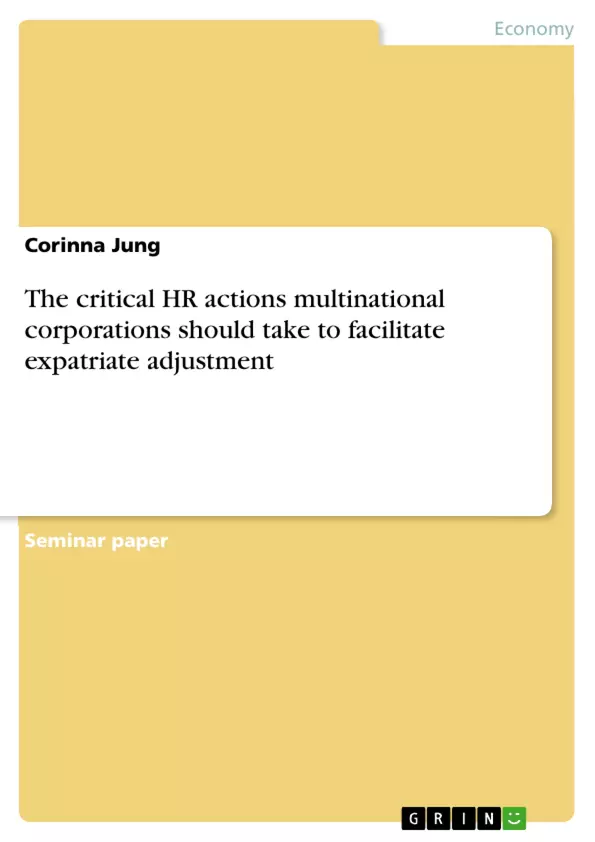1. Introduction
The process of globalisation of business stimulates the mobility of employees and necessitates the Human Resource Management of multinational corporations (MNC) to deal with given cultural conditions of particular countries in order to assess and evaluate their characteristics and value systems. On this basis, a common value orientated corporate culture might be developed which gives an MNC orientation and hence the basis for business success (IBM, 2011).
In principle, political and economic characteristics across the globe are structured in terms of the Anglo-American and Rhineland capitalism (Michel Albert, 1991). Cultural differences can be measured on a global, regional, national and organisational level (Edwards and Ress, 2006) and can be distinguished in “Linear-Active-Multi-Active” societies such as e.g. Latin America that is flexible in terms of management rules and “Dialogue-Orientated-Data-Orientated societies” such as e.g. Germany that is more linear orientated focusing on e.g. punctuality (Lewis, 1999). Mostly, the cause for failure in cross-cultural businesses is not the dissimilarity of partners but the lacking understanding for the adverse culture (Trompenaars and Hampden-Turner, 1997). The greater the cultural distance however, the more there is a need for parent country national control. Therefore, relevant actions of the International Human Resource Management (IHRM) include having the awareness and knowledge of the diverse cultural differences, supporting assignees in this sense and analysing the difficulties of intercultural interaction within the corporation in order to minimize barriers to collaboration (Holtbrügge, 2008).
The subsequent study will critically look into the subject of the IHRM with focus on expatriate adjustment. Beginning with an explanation of the basics and major reasons of expatriate adjustment, the study analyses the cultural dimensions that might influence this challenge. Subsequently the study discusses the actions of the IHRM concerning deployment and suggests measures how expatriate adjustment in MNCs might be facilitated.
Inhaltsverzeichnis (Table of Contents)
- Introduction
- Major reasons of expatriate adjustment
- Cultural adjustment
- Hofstede's five dimensions
- Implications to facilitate expatriate adjustment in the work place
- Conclusion
Zielsetzung und Themenschwerpunkte (Objectives and Key Themes)
This study critically examines the role of International Human Resource Management (IHRM) in facilitating expatriate adjustment within multinational corporations (MNCs). It explores the key cultural dimensions that influence expatriate experiences and examines how IHRM practices can be tailored to minimize cultural barriers and facilitate a smooth transition for expatriates.
- The importance of expatriate adjustment in the context of globalized business
- The influence of cultural dimensions on management practices and expatriate experiences
- The role of IHRM in supporting expatriates and fostering cross-cultural collaboration
- The application of Hofstede's cultural dimensions framework to analyze expatriate adjustment
- Strategies for facilitating expatriate adjustment in the workplace
Zusammenfassung der Kapitel (Chapter Summaries)
- Introduction: The chapter introduces the study's focus on expatriate adjustment within MNCs, highlighting the increasing importance of IHRM in navigating cultural complexities in a globalized business environment.
- Major reasons of expatriate adjustment: This chapter examines the motivations behind expatriate assignments, including the need for managing foreign subsidiaries, transferring knowledge and skills, and developing international management teams.
- Cultural adjustment: This chapter explores the concept of cultural adjustment and its impact on expatriate experiences. It analyzes the five dimensions of culture according to Hofstede's framework, outlining their significance for understanding cultural differences and their implications for expatriate adjustment.
Schlüsselwörter (Keywords)
This study focuses on the crucial aspects of expatriate adjustment within multinational corporations (MNCs). Key concepts explored include International Human Resource Management (IHRM), cultural dimensions, Hofstede's framework, expatriate selection, training, cultural shock, cross-cultural management, and strategies for facilitating expatriate adjustment.
Frequently Asked Questions
What are the main reasons for expatriate assignments?
MNCs use expatriates to manage foreign subsidiaries, transfer technical or managerial knowledge, and develop the international skills of their management team for future global leadership roles.
How does Hofstede's framework help in expatriate adjustment?
Hofstede's five dimensions (Power Distance, Individualism, Masculinity, Uncertainty Avoidance, and Long-Term Orientation) provide a tool for IHRM to understand cultural differences and prepare assignees for the specific social and work environment of the host country.
What causes failure in cross-cultural business?
Failure is often not caused by the differences themselves, but by a lack of understanding and preparation for the adverse culture. High cultural distance increases the risk of "culture shock" and poor work performance.
What critical HR actions facilitate expatriate adjustment?
Key actions include rigorous selection based on cross-cultural competence, providing intercultural training, supporting the expatriate's family, and establishing clear communication channels between the parent company and the subsidiary.
What is the difference between "Linear-Active" and "Multi-Active" societies?
Linear-active societies (like Germany) focus on punctuality and data. Multi-active societies (like Latin America) are more flexible with management rules and focus on interpersonal relationships and dialogue.
- Citation du texte
- Corinna Jung (Auteur), 2011, The critical HR actions multinational corporations should take to facilitate expatriate adjustment, Munich, GRIN Verlag, https://www.grin.com/document/183153



